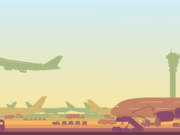The COVID-19 pandemic is threatening to destroy Africa’s travel and tourism sector, according to five international air transport and tourism organizations, which called on international lending institutions and others Wednesday to provide urgent funding.
The five organizations ─ the International Air Transport Association (IATA), the United Nations World Tourism Organization, the World Travel and Tourism Council (WTTC), the African Airlines Association and the Airlines Association of Southern Africa (AASA) ─ said international financial institutions, international donors and country development partners should provide $10 billion in relief to the industry.
In addition, the organizations said the continent’s travel and tourism sector requires access to “as much grant-type financing and cash flow assistance as possible,” financial measures to minimize disruptions to credit and liquidity for businesses and an assurance that funds be provided immediately to save businesses that urgently need cash.
Although some African governments are trying to provide aid to their travel and tourism sectors, many lack the resources to help the industry and the estimated 24.6 million people who work in it, IATA said.
“Containing the pandemic is the top priority,” said IATA Director General and CEO Alexandre de Juniac. “But without a lifeline of funding to keep the travel and tourism sector alive, the economic devastation of COVID-19 could take Africa’s development back a decade or more.”
WTTC President and CEO Gloria Guevara said, “Travel and tourism is the backbone of many economies across Africa, and its collapse will lead to hundreds of millions of livelihoods being impacted and enormous financial pressure for years to come.”
AASA CEO Chris Zweigenthal added that effects of the pandemic in Africa are “brutal. Air travel and tourism have essentially shut down. Now, more than ever, international countries need to come together to help those communities that are most vulnerable. The survival of our industry and its allied sectors has serious ramifications for Africa’s entire air transport system.”


